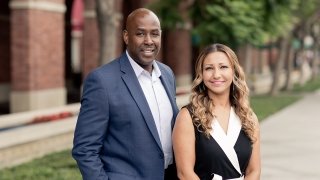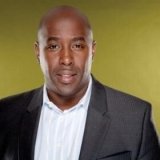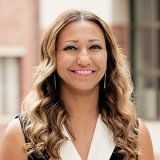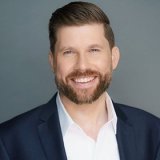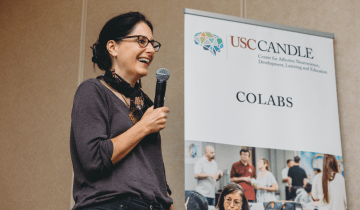The opening panel of a recent summit titled “(de)institutionalizing Islamophobia on College Campuses” confronted the facts head on: Anti-Muslim incidents were on the rise in the United States throughout the 2016 presidential campaign.
Summit organizers were hoping they could help reverse the trend by giving tools to the 90 students, faculty and higher education professionals in attendance, representing 20 institutions from across the country.
Through the summit and other events, the Center for Education, Identity and Social Justice has made Muslim students a focus of campus climate efforts, given the new urgency in the months following the issuance of Executive Orders 13769 and 13780 — also known as the Muslim travel bans.
“We see the aftermath of the travel bans as an opportunity for confronting institutional discrimination with a call for transformation of academic institutions,” says Darnell Cole, associate professor of education at USC Rossier and co-director with Shafiqa Ahmadi, associate professor of clinical education, of the center. “We want to lean in to better support those students most harmed by these policies.”
The center formally launched on Feb. 1, five days after the announcement of the first iteration of the Muslim travel ban.
A RISE IN TARGETING
In 2015, the FBI reported a six-percent increase in hate crimes over the previous year; attacks against Muslims represented the biggest jump, with an alarming rise of 67 percent from 2014. The Southern Poverty Law Center documented nearly 900 hate incidents in the 10 days following the 2016 presidential election.
The Council on American-Islamic Relations (CAIR) reported similar trends among students, from bullying in middle schools to intimidation and assaults on college campuses.
“According to recent climate reports, most Muslim college students feel uncomfortable on campus, feel that they don’t belong and feel that they are treated differently than other students,” said Marwa Rifahie, a 2011 graduate of USC Gould Law School and a civil rights attorney for CAIR-LA.
Rifahie was one of five panelists — all of them Muslim women — to offer their expertise at the summit, which was the center’s inaugural event.
Rifahie added that data also show that when individuals have no knowledge, background or interpersonal experience with Muslims, they are more likely to view Islam negatively. She and her fellow panelists also noted other inequitable treatment documented on campuses today, including blacklisting of Muslim student organizations and the criminalization of students who attempt to assert their rights.
EMBRACING INTERSECTIONALITY
Ahmadi and Cole seek to examine how multiple identities such as religion, ethnicity, race, gender, sexual orientation and disability intersect to foster shared values and democratic ideals.
“Intersectionality allows us to connect and understand each other in a more nuanced way, taking into consideration the complexities of our identities,” says Ahmadi.
To Ahmadi and Cole, intersectionality is more than a focus of research and action — it is part of their own experience.
“I was a refugee kid who immigrated to this country, learned English, got my education, went to law school and became a faculty member at one of the best universities in the country,” says Ahmadi. “Darnell is an African-American man who grew up in the South and was raised in a Christian family.”
Together, they take their own lived experiences, along with their professional and academic expertise, and apply them to the rigorous research they conduct.
One of their inaugural projects is a survey of more than 100 Muslim college students from across California. They are documenting and analyzing the students’ experiences during and after the 2016 election. The study includes those at community colleges, liberal arts institutions and major research universities — both private and public — in major urban centers as well as smaller communities. The center plans to expand this study to ultimately encompass all 50 states.
OVERCOMING STIGMAS
Ahmadi sees the study of Muslim college students as a way to let students tell their own stories as Muslims, many of them immigrants like her who are in college despite the challenges they faced inside and outside the classroom. Ahmadi is also a model of intersectionality in her embrace of multiple identities — immigrant, refugee, Muslim, woman, mother, attorney, professor.
Such mastery does not co identities in order to create a safe environment for themselves.
“When an African-American woman dons the hijab, many see her only as a Muslim, the ‘other.’ She ceases to be African-American,” says Ahmadi. “She loses her own agency to create and control her own identity. Unfortunately, this change in identity happens not because of who we say we are as Muslims, but because stereotypes are imposed upon us.”
Shabana Mir, author of the book Muslim American Women on Campus: Underground Social Life and Identity (University of North Carolina Press, 2014), acknowledged the stigma associated with being visibly Muslim.
“Muslim students who are visibly religious tend to face more negative encounters and attacks,” she said in a panel on intersectionality and diversity. “These students are expected to cover their difference, downplay their difference.”
A COMMITMENT TO ACTION
During the summit’s workshop, the 90 attendees, including Tina Aoun, the director of the Middle Eastern Student Center at UC Riverside, drafted their commitment to deinstitutionalize Islamophobia on their own campuses. They were asked, “What aspect of Islamophobia were they going to interrupt? What resources did they need? What were the action steps needed? What is the realistic timeline?”
Aoun saw faculty training as a priority.
“You need to have staff and faculty who are not just ‘tolerant’ or ‘accepting’ of Muslim students,” she qualified, “but who are advocates for them; and we want to make that happen at UC Riverside. I’m one person, but I’m sure with the students we can make that happen.”
Aoun echoed other comments from throughout the day about how all students, no matter their identities, seek camaraderie and connection.
“A lot of our Muslim students are looking for ways to be advocates and to connect with staff, faculty and their peers who are not Muslim to find support. And beyond support, beyond friendship, beyond allyship, they've been looking for services,” said Aoun.
Comprehensive services, summarized Cole, must include staff and faculty training, policy changes around religious holidays, dedicated spaces and resources and interventions against Islamophobia.
“And talk to your students,” he concluded. “Not just inside the classroom, but also outside.”
Current and Upcoming Projects
While many of the center’s efforts aim to inform educators and administrators and provide them with the tools needed to foster opportunities and understanding, other projects empower young people directly. For example, Hack SC Jr. pairs USC computer science students with teams of fourth- through eighth-graders, who learn coding by taking on a project they find personally meaningful. The program is targeted at first-generation or low-income students who might otherwise lack access to such training.
“Promoting technology literacy is an important social justice goal, and we feel that today’s generation should have complete access to computer skills,” Cole says.
Another project explores the effectiveness of personalized learning models in helping the underprivileged succeed in college. This effort’s longitudinal research focuses on USC Hybrid High, which was founded by USC Rossier in 2012 and is operated by the Ednovate charter management organization. While Ednovate’s customized model has shown success in getting students ready to enter college, Ahmadi and Cole are looking at what it takes to get them to persist until graduation.
“It’s a two year-project right now, but we’re working on extending it to four or even five years,” Cole says of the study tracking 2016 and 2017 Hybrid High alumni.
The center also hosts continuing legal education lunches, during which USC Rossier students, staff and faculty discuss important issues at the intersection of law, education and social justice.
Other initiatives to expand educational horizons include College Access Day, overseen by Associate Professor of Clinical Education John Pascarella. The event brings hundreds of high school juniors and seniors to the USC University Park Campus from schools in low-income neighborhoods. In addition to meeting USC faculty and students and being exposed to the different perspectives and possibilities universities offer, participants receive help filling out the Free Application for Federal Student Aid.
While College Access Day predates the center, it is growing under its aegis, now attracting some 200 students.
Meanwhile, Project 100 is another center initiative aimed at giving the marginalized a voice and making it heard. Launched by Mark A. Pearson EdD ’12, this documentary series is assembling 100 video narratives that analyze the convergence of identity in terms of academic and social outcomes.
Affiliated faculty come from the USC Gould School of Law and the USC School of Dramatic Arts, as well as the University of San Diego and the National Institute for Transformation and Equity at Indiana University.

